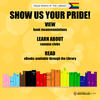| Sun | Mon | Tue | Wed | Thu | Fri | Sat |
|---|---|---|---|---|---|---|
|
31
|
||||||
|
|
||||||
|
Show all Hide all |
Show all Hide all |
|||||
|
1
|
2
|
3
|
4
|
|||
|
|
|
|
|
| Sun | Mon | Tue | Wed | Thu | Fri | Sat |
|---|---|---|---|---|---|---|
|
31
|
||||||
|
|
||||||
|
Show all Hide all
|
Show all Hide all
|
|||||
|
1
|
2
|
3
|
4
|
|||
|
|
|
|
|

This June, the Library's Student Engagement Committee has partnered with campus clubs and organizations to promote the 2SLGBTQ+ books in our collections as well as campus clubs and the services they provide. Students from Glow, Drag Club, QuAQ and QTPOC.KW sent in their recommendations for the books important to them, describing the impact the book had on their lives.
Through targeted funds, the Library is actively ensuring Indigenous voices are represented in the collection.
In this workshop we will introduce Open Textbooks, what they are and how you can use them in your course. Key points we will discuss are the following:
This session will help instructors get started with finding open activities, exercises, and student work samples to use in their courses. It will briefly highlight some useful repositories and strategies for finding these types of open education resources.
We will have time for questions during the webinar, but if you have any in advance please feel free to share them with presenter Rebecca Hutchinson, Liaison Librarian for Mathematics, Physics, and Computer Science, at r3hutchinson@uwaterloo.ca.
The University of Waterloo acknowledges that much of our work takes place on the traditional territory of the Neutral, Anishinaabeg, and Haudenosaunee peoples. Our main campus is situated on the Haldimand Tract, the land granted to the Six Nations that includes six miles on each side of the Grand River. Our active work toward reconciliation takes place across our campuses through research, learning, teaching, and community building, and is co-ordinated within the Office of Indigenous Relations.
Select 'Accept all' to agree and continue. You consent to our cookies if you continue to use this website.